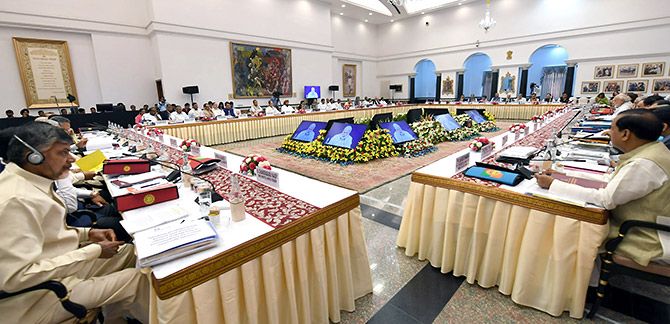'The Constitution must reflect the reality of mature states because otherwise it is the Centre that will become irrelevant,' says T C A Srinivasa-Raghavan.

In less than a year we will have a new government. The states will have a very big say in it.
So regardless of which group of politicians forms it, what should be its major agenda?
There are several levels at which this question can be answered, the most boring being the election manifesto-type of dhobi lists. Those, as economists might say, are necessary but not sufficient.
What is necessary -- though not sufficient -- is a thorough review of the central assumption that drives our governance system, namely, that a strong Centre is an absolute must -- which, yes, of course, it is.
But in which areas do we need a strong Centre? Surely not in just about everything that anyone can think of, as is the case now.
A few areas are, of course, non-negotiable. Defence, communications and currency are three such. So are a few others in the Central List of the Constitution.
But this list also has a lot of other things that needn't be there any longer because the context has changed.
Time has a way of doing that.
Therefore, one task for the next government should be to review the Central List with a view to pruning it.
This should be done by moving as many items as possible to the States List, which needs to be expanded.
This is the central message of the current political stacking up.
When the Constitution was finalised, the fear was that one or many states would want to break away. These were called 'fissiparous' tendencies.
Those tendencies, however, disappeared at least 40 years ago, for an age-old reason: The Indian trough became big enough to let all the pigs get their snouts into it.
Or, more politely, the economic benefits of staying in the Union began to far outweigh the costs of breaking away.
Not even the idiots in the Kashmir valley want that now. The gravy is too thick and plentiful.
If this argument is granted, how 'powerful' should the Centre be?
What does 'powerful' mean now?
This is what needs to be reviewed by a new committee comprising persons from the legal, economic and political professions.
Ex-bureaucrats must be kept out at all cost because any change would be inimical to their professional interests of blocking change.
Fundamental to the exercise I am proposing above would be a review of the notion, put forth by the Supreme Court in the early sixties, that India is not a federation in the American or Canadian sense but a 'Union of states'.
In turn, central to that notion was the belief that the states could not be trusted to do their own thing and that they needed a stern nanny in the form of the central government.
To get a sense of this, you need to read Nehru's letters to chief ministers. They are wonderful sermons on how to govern.
But everyone grows up, which is why two chief ministers -- H D Deve Gowda and Narendra Damodardas Modi -- with no previous experience of the central government have already been prime ministers. More are waiting in the wings.
The Constitution must reflect this reality -- of mature states -- because otherwise it is the Centre that will become irrelevant.
Indeed, financially, with the GST, it has already taken a giant step in that direction.
Politically, too, India is reverting to its natural form of governance. It is inventing a modern form of mansabdari where instead of soldiers on horses, it is MLAs with money that matter.
The Constitution does not reflect this reality, either.
What it does, instead, and all too often, is to confuse process with power.
India's must be the only Constitution in the world that is so pre-occupied with process. Some of this is good, but as Article 311 proves, some of it is counter-productive.
Besides, even if this was understandable when the Constitution was framed as a way of ensuring safeguards, surely there is scope for some review of these 'safeguards' now.
What I am proposing will not get considered, let alone done because of a very simple reason: No central government will move a Bill that reduces its power and powers.
This is the central governance problem we face now. The rest, as they say in the Punjab secretariat, is detail di gal.











